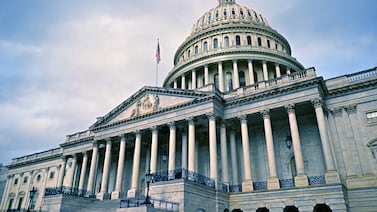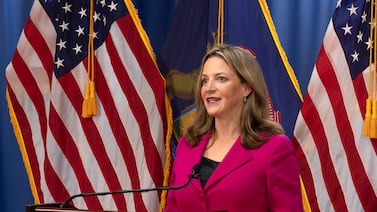Votebeat is a nonprofit news organization reporting on voting access and election administration across the U.S. Sign up for Votebeat Wisconsin’s free newsletter here.
More jurisdictions around the country are using commercial electronic pollbooks to check in voters, but many Wisconsin officials say they’re reluctant to give data to outside companies — and especially worried about using products that connect to the internet.
Currently, the only e-pollbook option Wisconsin allows is Badger Book, which about 400 municipalities use. The product was designed by the Wisconsin Elections Commission and doesn’t connect to the internet. But it’s expensive and has limited features, clerks say, and officials in the largest jurisdictions, such as Madison, worry they wouldn’t get enough tech support if they used Badger Book.
The commission on July 17 unanimously voted to create a working group of municipal and county clerks to explore commercial options, but many officials are openly skeptical.
WEC Administrator Meagan Wolfe, who isn’t a voting member of the commission, said she’s eager to hear what the clerks need, but “particularly concerned about the safety of the data in the statewide voter registration database.”
“Up until this point, we’ve never even had conversations about sharing that with an outside vendor,” she said.
That sets Wisconsin apart from most states.
The number of states and U.S. territories using e-pollbooks nearly doubled between 2008 and 2024. Nearly 40% of jurisdictions across the nation now use them, and most use commercial products made by outside vendors.
With adoption spreading rapidly, the U.S. Election Assistance Commission recently developed standards for e-pollbooks, and many states have their own. The federal guidelines require meeting multiple security standards, ranging from physical security to having multi-factor authentication. Only one product so far, made by KNOWiNK, has been certified by the U.S. EAC.
Wisconsin election administrators built Badger Book themselves to save money and control the design, said Kevin Kennedy, who was Wisconsin’s election chief for more than 30 years. Kennedy said that cybersecurity is emphasized more now than when Badger Book was first designed, because there is more known about security vulnerabilities and how to combat them.
Does internet connection make e-pollbooks riskier?
Some commercial e-pollbooks have a constant internet connection, but they can have restricted access. Others are designed to operate offline on Election Day.
Pollbooks connected to the internet can allow for features such as real-time information on whether a particular person has already voted, live turnout data, or a record of how many ballots a polling site has left. Those functions can prevent somebody double-voting or keep a precinct from running out of ballots.
Several Wisconsin election officials said such features may come at a cost to security.
Ann Jacobs, the Democrat who chairs the state election commission, said she doesn’t believe an e-pollbook should connect to the internet on Election Day “unless something massive changes in security.”
“I think we’re setting ourselves up for every possible nonsense conspiracy theory,” she said.
Some election officials try to defuse conspiracy theories by reassuring voters that their voting machines don’t connect to the internet. But those statements also lead some voters to believe that any type of internet connectivity at a polling place is a bad thing, said Derek Tisler, counsel in the nonprofit Brennan Center for Justice’s election and government program.
“They may not understand the distinction between a system used to check in voters having an internet connection and a system that is used to count ballots having an internet connection,” he said.
The worst-case scenarios for e-pollbooks getting hacked would be somebody stealing voters’ personal information, deactivating voter records, or making it look like a person had already voted, said Megan Maier, the deputy director of research and partnerships at Verified Voting. Meier and other experts said there is no known case of that happening.
That risk would be mitigated, Maier said, if polling sites all had paper pollbooks printed out in addition to e-pollbooks.
In Wisconsin, the election commission trains clerks using Badger Book to have a paper backup, and requires them to sign an agreement saying they “should” have paper backups.
There have been cases when hackers have accessed or breached voter registration data, at least in one case because of weak vendor security on other kinds of systems, but they haven’t involved e-pollbooks.
In one 2016 case in North Carolina, election officials had to contend with problems when an e-pollbook system inaccurately showed that voters had cast ballots when they had not, along with other malfunctions. The state required the county to use paper pollbooks to check in voters, and voting resumed.
There’s no definitive answer on whether in-house or commercial e-pollbooks are better or more secure, said Tisler, from the Brennan Center. Existing commercial products offer benefits such as more maintenance support and established security practices, Tisler said.
One area of concern, said Madison Interim Clerk Mike Haas, is that the federal Cybersecurity and Infrastructure Security Agency has reduced its offerings to local election officials.
Earlier this year, the agency suspended some security assessments of local election systems. CISA didn’t immediately answer a question about whether those services had resumed.
Losing CISA’s security assessments is “significant,” said Trevor Timmons, from The Elections Group. Although some states and the federal government have e-pollbook security standards, he said, having an on-the-ground assessment is the best way to evaluate a jurisdiction’s potential security vulnerabilities, and most municipalities can’t afford to have a private company do it.
Nonetheless, Haas said, Wisconsin has to keep exploring options.
“If other states are able to do it in a secure way … I think Wisconsin ought to be able to have nice things too.” said Haas, the former administrator of the Wisconsin Elections Commission.
Clerks’ concern: Are voters ready for internet-connected e-pollbooks?
But even clerks who are frustrated with Badger Book have reservations about an option that’s internet-connected.
Elena Hilby is the clerk of Sun Prairie, Wisconsin’s first municipality to adopt Badger Book. She has been critical in the past of the state’s e-pollbook and interested in commercial alternatives, but she told Votebeat that she’s “not 100% sure” that Wisconsin voters are ready for an internet-connected product.
Julie Huotari, the town clerk of Woodruff, said Badger Book made a lot of things easier but the small screens and an abundance of cords have made it hard for older poll workers to use.
She said she would be open to any products that the Wisconsin Municipal Clerks Association and election commission recommends, but said she’s not in favor of using an internet-connected e-pollbook. “I don’t care how strong your security is, anything can be hacked,” Huotari said. “I just don’t want to go down that road, personally.”
Fredonia Village Clerk Michelle Johnson used to be deputy clerk in Boxford, Massachusetts, which used a commercial vendor’s e-pollbook for early voting, though not on Election Day.
That pollbook connected to the internet only at the end of the night, she said, when poll workers would upload voter turnout data. It made her more comfortable not to be connected to the internet during voting, she said, but she was OK with using the internet to upload the turnout data, because there was “a paper trail for every single action that we take on Election Day that backs up the electronic poll list.”
Eileen Newcomer, deputy director of the League of Women Voters of Wisconsin, said the issue of using internet-connected commercial e-pollbooks would fly under the radar for many voters. But she said she worries about taking that step when the state is still trying to get all clerks to switch from Gmail and other email services to government accounts.
“I just don’t think we’re at a culture within clerks at this time to really take cybersecurity as seriously as they need to,” she said. “I think that our elections are secure, but I think opening it up to more risk at this time is not the move to make. You got to shore up what we already have.”
Alexander Shur is a reporter for Votebeat based in Wisconsin. Contact Alexander at ashur@votebeat.org.





